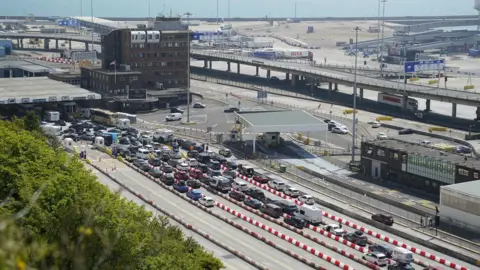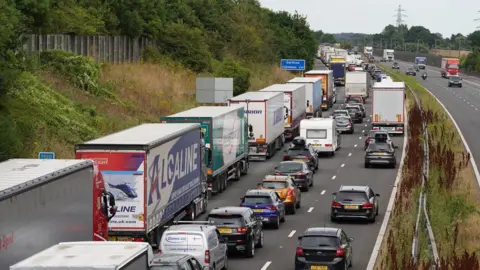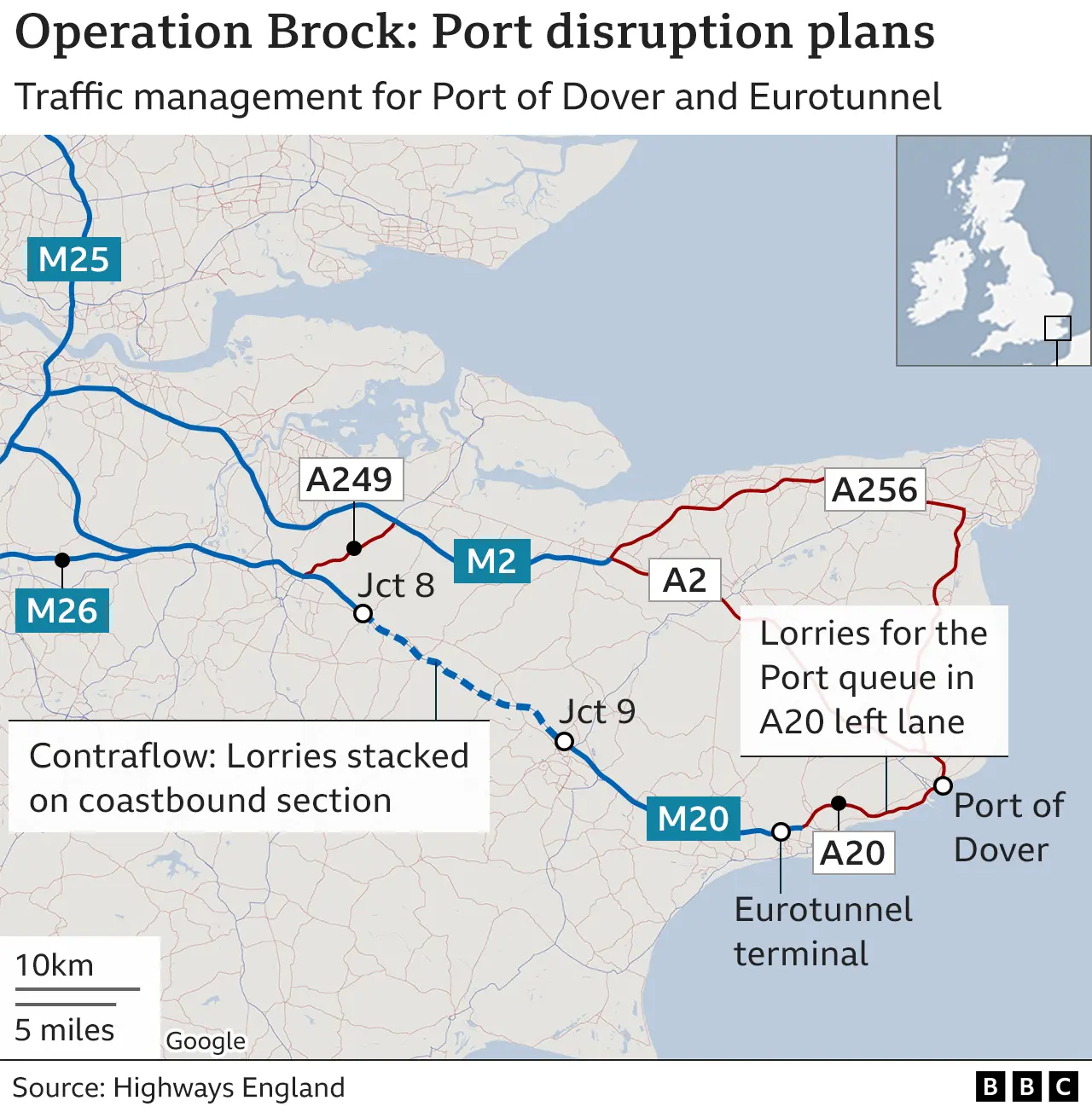Eurotunnel and Dover queues: Drivers warned of summer of Channel traffic delays
 PA Media
PA MediaPeople hoping to cross the Channel to France this weekend are being warned it will be very busy again, after three days of queues and delays.
And that pattern could continue with drivers warned by the AA they could face a summer of repeat delays.
Vehicles flowed freely on Monday after a weekend that saw miles of tailbacks build up in Kent.
Kent Resilience Forum's Toby Howe said it was a "very vulnerable situation" and it took little to cause congestion.
Queues of lorries began to build at Dover in the morning, although the port said traffic was flowing normally.
Ferry operator DFDS said there were "small queues" and asked passengers to allow at least 90 minutes to get through border controls, while P&O ferries said the roads leading to the port were clear.
- Delays finally easing for Eurotunnel travellers
- Gridlock persists for thousands travelling to France
- Do you want to be a BBC Travel Watcher? Get in touch.
Over the weekend, traffic built up on the roads leading to the Eurotunnel terminal in Folkestone and Port of Dover after the M20 motorway through Kent to the south coast was closed to cars from Maidstone to Folkestone because of Operation Brock, which sees lorries diverted to park on the motorway.
With the motorway shut, car drivers were diverted to smaller roads which then got jammed with miles of tailbacks.
Some people reported sleeping overnight in their cars, while one tired family said the last three miles of their journey took 21 hours.
Mr Howe said things were back to "business as normal" but remained "on a knife edge" with not much needed to create congestion.
He told BBC Radio 4's Today programme the coming weekend was expected to be the second busiest getaway weekend of the summer holidays and, with traffic crossing the Channel back to pre-pandemic levels and additional checks at the border since the UK left the European Union, it took "very little to cause those tailbacks".
He said on Friday the Port of Dover had issues with a lack of resources, which was compounded by a crash on the motorway.
"You only need another crash on the road or maybe a train breakdown or a power failure somewhere for it to then become a big problem."
Mr Howe said there needed to be more infrastructure in place to take traffic off the roads, such as lorry parks.
"We shouldn't really have to have queues of traffic due to all of this, so we need more infrastructure in place," he said.
 PA Media
PA MediaThe AA's head of roads policy Jack Cousens said it had been an "incredible weekend of traffic jams" but warned the group was concerned "we could be in for a repeat of this congestion across the summer".
John Keefe, director of public affairs for Getlink - which operates the Eurotunnel between Folkestone and Calais, said the issue over the weekend had been caused by the expected "very heavy traffic of passengers" getting away on holidays alongside an unexpected amount of truck traffic, which would normally have crossed to France earlier but had been delayed by an accident on the motorway.
He said there were several factors that could help ease the situation, including bringing in digital technology to speed up border checks, increasing the resilience of the road network - with two of the UK's biggest ports served by the same motorway - and improving the Channel tunnel railway network.
Mr Keefe added: "There are definitely solutions. These solutions are not new. They've been on the table for many, many years.
"But hopefully something like this will actually focus attention."


The Dover delays led to a war of words between French and UK officials, with both sides blaming the other.
The UK government said French authorities failed to provide enough border staff to check passports at Dover over the weekend, while the French transport minister Clement Beaune highlighted additional border checks brought on by Brexit.
Downing Street has insisted the issues were not caused by Brexit, with the Prime Minister's official spokesman saying they were down to a combination of factors "including a shortage of French border control staff".
He said the government understood the post-Brexit changes required and had planned for it, adding: "We think we have operational procedures and processes in place that do not need to see these levels of queues."
However, travel journalist Simon Calder said we were seeing the impact of leaving the EU for the first time during peak summer travel season as passenger numbers returned to pre-pandemic levels.
Whereas in the past passport control had been able to wave travellers through with a flash of their passport at their discretion during busy times, he said, now they had to check and stamp every passport.
Mr Calder said on average it was taking about a minute and a half for them to process a family of four.
Over the weekend the Port of Dover said it handled almost 142,000 passengers.
National Highways re-opened the coastbound M20 between junctions 9 and 11 in Kent shortly after 01:00 BST on Monday, but it remains closed to non-freight traffic between junctions 8 and 9 as part of Operation Brock.
Dover MP Natalie Elphicke said the "entire discreditable episode" highlighted the need to make Kent's roads as resilient as possible.
She called for more investment in border systems and upgrades to the A2 and lorry parks.

Are you planning on travelling via Dover this weekend? Do you have concerns about delays?
- Email [email protected]
- WhatsApp: +44 7756 165803
- Tweet: @BBC_HaveYourSay
- Please read our terms & conditions and privacy policy


- 'WEAPONS CAPABLE OF ERADICATING OUR SPECIES': Matthew Syed calls for a nuclear awakening
- OUR BRAINS AS PREDICTION MACHINES: How do our beliefs shape our reality?

